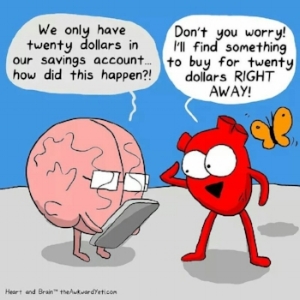Anxiety. Depression. Fear. Worry about the future. Don't worry - all these are common when you have a heart condition. Whether it be worrying about every little niggle that you feel (this is normal and due to you becoming extra sensitive to pain after a heart problem) to fear about whether you will be able to do all of the things you love again (tennis, golf, sex...?). Stop and take a breath - not only is it common, it's completely normal. Everyone recovers differently and goes through several different cycles before they feel themselves again (well a different version of themselves but one just as good as the past version!).
- You may go through denial, fear, grief, frustration and sadness (sometimes all at the same time!)
- You may take months to come to terms with the new 'you'
- You may 'bounce back' with a can-do attitude only to hit a brick wall a few months later
- You may have the 'tough guy/funny girl' exterior but be in agony on the inside
- You may have a million more different experiences unique to you
Whilst there is no quick fix, there are a few things that you can do to make sure you are looking after your mental health as well as your physical:
- Talk to someone about how you are feeling. Your partner, friend, children, doctor, nurse, rehab team, Facebook group. By talking about how you feel people will be understanding and helpful. You may be surprised to hear that they may have gone through something similar and can offer a lot of advice and support. Sometimes they don't have to say anything, just being an ear to listen to you may be enough.
- See a psychologist. Often the impartial, stranger's ear may be the best forgetting everything off your chest (literally)
- Use exercise as a source of stress and anxiety relief. Walking can be great for your mental health. Pop on some of your favourite music which can help to get you going. Even 5-10 minutes will do some good.
- Avoid too much alcohol or caffeine. Both are ok in small amounts but caffeine will increase anxiety and feelings of stress and alcohol is a depressent that will make you feel better for a few hours and much much worse afterwards.
- Try mindfulness and meditation - I've put a list together below of good Apps that you can download on your phone for free that can help you to unwind, relax and even help you get to sleep. Simply search on your App store on your phone for the names below. If you don't have a smartphone, you can order meditation CDs from Amazon like this one.
1. Sleep Easily Meditation
This app a 25-minute guided meditation that combines soothing music with talking you through the relaxation process. The female voice is surprisingly calming – I was out for the count within 10 minutes.
2. Calm – meditation and relaxation
This simple to use app presents the 7 Steps of Calm. There are seven guided sessions running from 2-20 minutes with a range of background scenes and sounds to choose from (think beaches, meadows and pouring rain).
Free for iphone and ipad
3. Simply Being Guided Meditation
Good for beginners, this easy-to-use app talks you through the basic skills in sessions ranging from 5-20 minutes. Choose your sound preference –the likes of ocean, rain and stream – and sit back and relax. It comes loaded with meditation tips too.
Available for iPhone, iPad and Android
4. Headspace: Guided Meditation
Headspace co-founder Andy Puddicombe is a former Buddhist monk aiming to make meditation accessible. He delivers the directed 10-minute sessions in his relaxed style - no hippy talk here, he strips it down to basics and throws in the odd joke.
http://www.getsomeheadspace.com
Free (upgrades offered too)
5. Room to Breathe Meditation
Nailing your breathing is key in helping you keep calm and switch off. This app can help anyone who has had problems meditating. There’s a step-by-step-guide to breathing techniques with music options to choose from too.
Available on iPad, iPhone and Android
6. Relax Melodies
Want to learn the art of power napping but can’t switch off? This app can help. Choose from a library of relaxing tracks. There’s a timer and alarm function to stop the nap becoming a deeper sleep.















